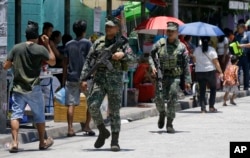A coalition victory in the Philippine Senate race Monday will expand President Rodrigo Duterte’s space to advance a deadly anti-drug campaign, rebuild crumbling infrastructure in the impoverished country and tighten relations with China by the end of his term in 2022.
Nine of the twelve winners in Senate races are backers of Duterte, who’s halfway through a six-year term, according to unofficial election commission totals released early Tuesday after overnight ballot counting. The other three seats went to independents and the opposition bloc won none.
The race among 62 candidates was widely seen as a national midterm vote on Duterte’s popularity.
“It’s basically who are for the president versus who are against him,” said Antonio Contreras, a political scientist at De La Salle University in the Philippines. He called the outcome a “referendum” on the president’s performance to date.
The results will give Duterte more confidence to complete his agenda, said Ramon Casiple, executive director with the Philippine advocacy organization Institute for Political and Electoral Reform in Metro Manila.
Duterte’s agenda
The Duterte administration hopes to join China in exploring for oil or gas in the South China Sea, tracts of which both countries call their own.
A maritime sovereignty dispute between the two countries had prompted Duterte’s predecessor to file, and win, a world court arbitration case against China in 2016. Duterte set aside the dispute, though Chinese vessels backed by the world’s third strongest military still control a contested shoal near Luzon Island.
China, however, in 2016 pledged $24 billion of aid and investment to the largely impoverished Philippines and committed about half of that to specific projects in April. Some of that funding will bankroll Duterte’s $169 billion, 5-year replacement of outdated or dilapidated infrastructure around the archipelago.
The president is expected to stick with the anti-drug campaign despite what local media outlets estimate at 5,000 deaths, many of them suspected dealers shot during raids by police. He has ordered police to use more restraint since public protests in 2017 against the killings of teenagers.
Duterte is also advancing tax reforms that are due to lower poverty to 14 percent of the 105 million population by 2022, down from about 22 percent now.
He needs from 50 to 75 percent of the 24-member Senate to pass some bills, especially outstanding tax reform measures, Casiple said. A hostile Senate could quash bills from the administration or float their own.
Economic stability
Voters in Metro Manila said Monday Duterte’s rule had led to cleaner, more drug-free neighborhoods as well as overall economic improvement.
Inflation of 6.7 percent that had vexed consumers in September and October had eased to 3.3 percent in March. Overall economic growth reached 6.2 percent in 2018.
In Pasay City, a hotel and shopping-rich municipality within Metro Manila, citizens are getting more funds for healthcare, while students are receiving more money for school, said May Isabela De La Pena, 45, a voter in the city and member of a neighborhood council.
“Many new buildings, many jobs, the children -- our students -- they have allowances every month (and) we have medical assistance coming from the city,” she said at a crowded elementary school campus where thousands were expected to turn out for 12 hours of voting.
Weak opposition
Duterte’s public satisfaction rating rose to 79 percent in the first quarter of 2019 from 70 percent in September and 74 in December, tracking the fall in inflation.
Despite opposition from academics and the military, Duterte’s 3-year friendship with China does not disturb most common Filipinos, political scholars say. Drug-linked slayings still alarm human rights groups on and offshore, but common people say the crackdown has made a lot of neighborhoods safer at night.
Opposition congressional candidates had criticized Duterte over China as well as drugs.
“The opposition has not done a good job in portraying itself in a sincere way,” said Eduardo Araral, a Philippine native and associate professor at the National University of Singapore’s public policy school. “They used the China angle, the drug angle, but none of those really stuck on Duterte.”
Pro-Duterte candidates for House of Representatives seats were expected to hold their massive majority today. That coalition now controls 245 of the 297 House seats.
Presidents in the Philippines by law can serve only one six-year term.






